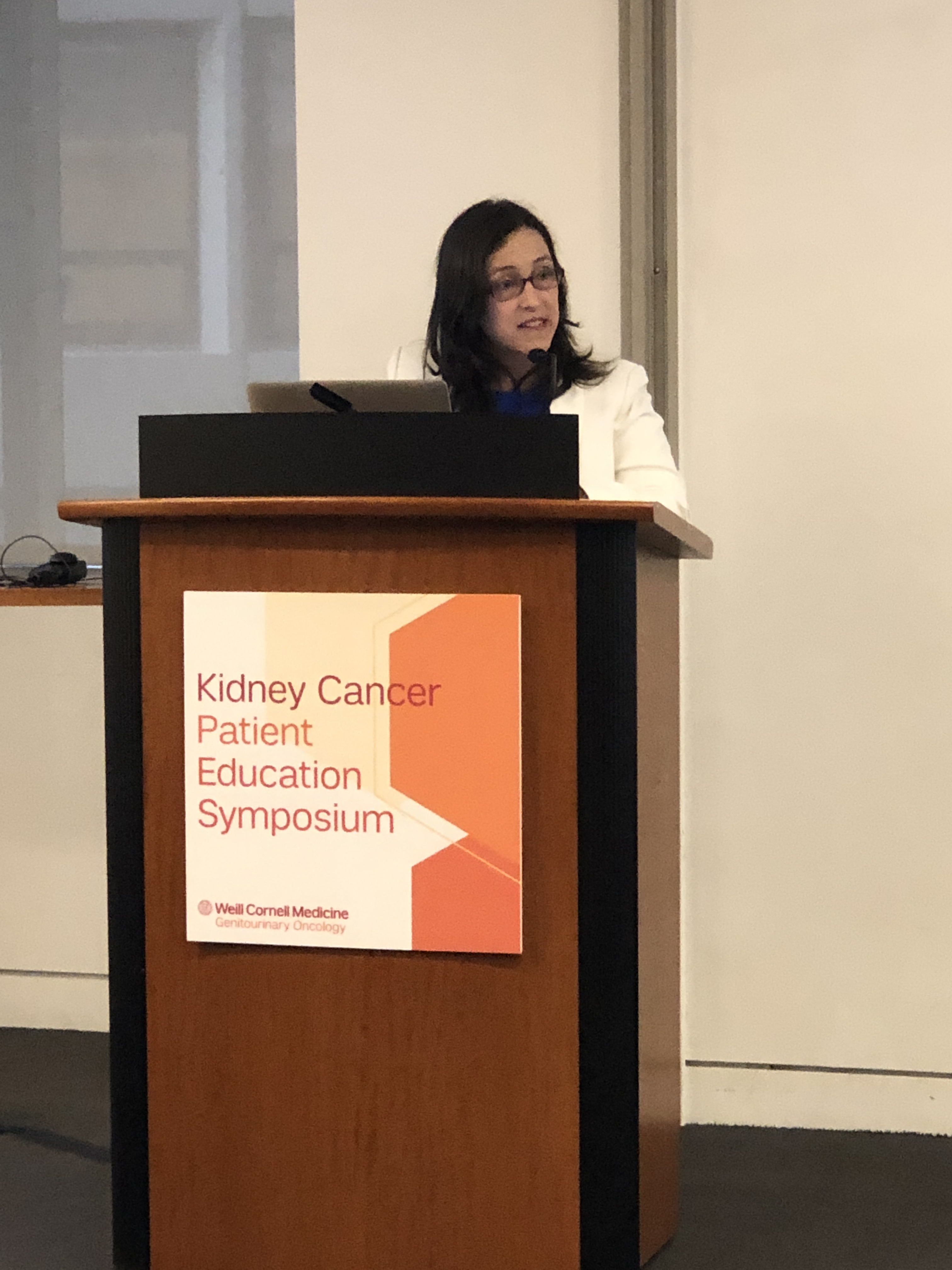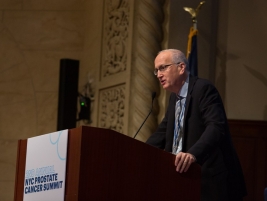The bladder is an organ in the lower pelvis responsible for storing urine. When cells in the bladder start to grow out of control, they can form tumors leading to bladder cancer.
Urothelial cancer is the most common form of bladder cancer and impacts around 80,000 people per year. This form of bladder cancer starts in the urothelial cells that line the inside of the bladder. Urothelial cancer may also occur in other areas of the urinary lining such as the inside of the kidneys (renal pelvis) and the tubes connecting the kidneys to the bladder (ureters)
The Weill Cornell Medicine Genitourinary (GU) Oncology Program works with a wide range of GU specialists to tailor treatments for each patient depending on their disease type and if they have metastatic disease, which is when the cancer has left the bladder or other areas of the urinary system and spread to other parts of the body through the lymph nodes or bloodstream.
Here are some of the treatment options offered for bladder cancer patients.
Chemotherapy
Chemotherapy is a common treatment option for patients with bladder cancer and can be given at a number of times throughout the treatment process. Chemotherapy may be given directly into the bladder or into veins before surgery to make a tumor easier to remove, after surgery or radiation to kill remaining cancer cells, or as a main treatment option for patients with metastatic disease.
Radiation Therapy
Another type of treatment used for bladder cancer is radiation. Radiation may also be given throughout the treatment process. It can be used after surgery, as a main treatment for earlier-stage cancers that may not require or be able to receive surgery or chemotherapy, or as part of a treatment regimen for advanced or metastatic disease. Radiation is often given along with chemotherapy to help the radiation work better, which is known as chemoradiation.
Stereotactic body radiation therapy (SBRT) is a type of radiation therapy that uses x-rays to kill tumor cells. This method is able to deliver radiation precisely to the tumors and may kill tumor cells with fewer doses over a shorter period compared to other types of radiation.
Immunotherapy
Immunotherapy drugs help the body’s immune system fight cancer by instructing the immune system to identify and destroy cancer cells.
There are a number of approved immunotherapy options that may be given to patients in a variety of different circumstances. Immunotherapy can be used in patients with non-muscle invasive bladder cancer though instillation in the bladder, into veins as an additional therapy after surgery, or into veins for advanced cancer.
One of the most common versions of immunotherapy are drugs called immune checkpoint inhibitors. Immune checkpoints are part of the natural body to keep the immune system from attacking normal cells (when this happens, we call it “autoimmunity”). Checkpoint inhibitors target “checkpoints”, or proteins on the immune cells, that cancer cells use to hide from the immune system. These drugs block the checkpoints allowing the body’s immune system to attack the cancer.
Surgery
Surgery is often done before or after other treatments in order to best maximize the results. A number of surgical techniques and options exist depending on the type of bladder cancer and whether or not it has spread beyond the urinary system. These range from endoscopic techniques where a tube is inserted into the urinary system to using cameras (often with the assistance of a robot) to open surgery with incisions through the skin. Sometimes the bladder needs to be removed and there are a number of techniques to either divert urine to the skin (often with a bag) or creation of a new bladder (called neobladder).
Clinical Trials
The Weill Cornell Medicine Genitourinary (GU) Oncology Program leads and participates in a number of clinical trials across a spectrum of disease areas, including bladder cancer. Our team is dedicated to evaluating new diagnostic and treatment approaches in order to develop the best options that benefit our patients. Clinical trials may be the right choice for some patients, and we encourage you to speak to your doctor about the options available to you.
Our team is currently leading a clinical trial evaluating the effects of adding radiation therapy to the immunotherapy drug atezolizumab, for the treatment of metastatic bladder cancer. The aim of this trial is to identify if the combination of radiation and immunotherapy may have the ability to boost the results of the immunotherapy drugs and may be more effective at killing tumor cells. Learn more about this trial here.
Another interesting trial has been developed based upon the laboratory work of one of our team members. For patients with bladder cancer invading the muscle layer and needing removal of the bladder (called cystectomy), the usual approach is chemotherapy followed by surgery. However, not all patients are able to safely receive the most effective chemotherapy drug called cisplatin. This trial is evaluating the use of an oral targeted drug called abemaciclib to take prior to surgery for these patients. Learn more about this trial here.
Antibody-drug conjugates are a type of targeted chemotherapy. To date, two have been approved by the U.S. Food and Drug Administration (FDA) in various situations. We currently have trials open to enrollment testing two of these antibody-drug conjugates, enfortumab and IMMU-132, either alone or in combination with other drugs.
Our team is continuously working on new research initiatives and clinical trial participation. You can find a full list of our open bladder cancer trials here.


